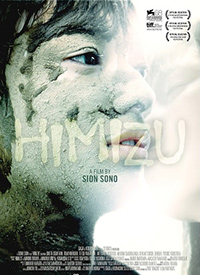Suffer the Children: Sono’s Social Dystopia a Melancholy Landscape
 It appears that 2014 will be a year that sees a flood of Sion Sono’s back catalogue finally hitting US theaters. A pair of 2011 titles will be released concurrently from Olive films, the cap of his hate trilogy, Guilty of Romance, and the more substantially impressive, Himizu, a manga adaptation updated to reflect the devastation of post-tsunami Japan. The flood continues with the release of one of Sono’s most restrained films ever with The Land of Hope, which closely examines a family in a fictionalized district directly affected by nuclear radiation. While Hope plays sort of like an update of Shohei Imamura’s Black Rain (1988), it’s a far cry from the desperate rage imploding the societal core clearly on display here. And while, by Sono’s standards, it seems just conservative enough with its violence to convey a sense of degradation before slumping into an apathetic home stretch, it’s the compelling duo at the center of the film that lends a sincerity often absent from Sono’s oeuvre.
It appears that 2014 will be a year that sees a flood of Sion Sono’s back catalogue finally hitting US theaters. A pair of 2011 titles will be released concurrently from Olive films, the cap of his hate trilogy, Guilty of Romance, and the more substantially impressive, Himizu, a manga adaptation updated to reflect the devastation of post-tsunami Japan. The flood continues with the release of one of Sono’s most restrained films ever with The Land of Hope, which closely examines a family in a fictionalized district directly affected by nuclear radiation. While Hope plays sort of like an update of Shohei Imamura’s Black Rain (1988), it’s a far cry from the desperate rage imploding the societal core clearly on display here. And while, by Sono’s standards, it seems just conservative enough with its violence to convey a sense of degradation before slumping into an apathetic home stretch, it’s the compelling duo at the center of the film that lends a sincerity often absent from Sono’s oeuvre.
The aftermath of a devastating earthquake, resulting in a physical landscape reduced to a rubble that seems to be the physical manifestation of a cruelly warped existence, finds lonely Sumida (Shota Sometani) making friends with a variety of people left to squat in tents nearby his rundown family business of boat rentals. A washed away shack prominently lurks in the surrounding body of water and business doesn’t really seem to be booming, though Sumida’s staunchly aggressive father shows up often to beat him up for money, while disinterested mom (Sono favorite, Megumi Kagurazaka) absconds with another man. At school, a homeroom teacher preaches syrupy propaganda about every student being a special flower, while Sumida’s disdain for all the bullshit brings him into orbit with Keiko (Fumi Nikaido), who harbors a secret crush on the brooding young man. It’s apparent that Keiko hails from an equally dysfunctional family, a mother whose melodramatic flourishes play like oddball hyperbole in comparison to the repetitive physical degradation Sumida must suffer. While Keiko plies herself on Sumida and tries to help him revamp business, a nasty loan shark (Denden) comes looking for a large amount of money that Sumida’s dad owes him. As valiantly as he tries to overcome his current existence, Sumida soon sinks into the envelope of despair that’s been creeping in at the corners since we were first introduced to him.
Himizu, so named for a mole indigenous to Japan that Sumida likens himself to, is clearly a dystopic parable about societal ills. Everywhere Sumida turns there is rampant and aggressive violence, which only begets more violence, as if some kind of invisible ills have seeped through the cracked earth and crushing debris, instigating the regression of civilization.
As is customary for many a Sono feature, off putting tonal shifts distract rather than add to the dramatic possibilities, which is unfortunate since Sumido and Keiko happen to be some of his most affecting protagonists to date. While Himizu may not be part of Sono’s Hate Trilogy (Love Exposure; Cold Fish; Guilty of Romance), something often caused by the absence of love, it may as well be, as it’s offering the same bleak portrait of a world gone mad, the love and care of another perhaps the one bit of redemptive hope to keep one’s head above water and one’s knife in the sheath.
★★★ / ☆☆☆☆☆


